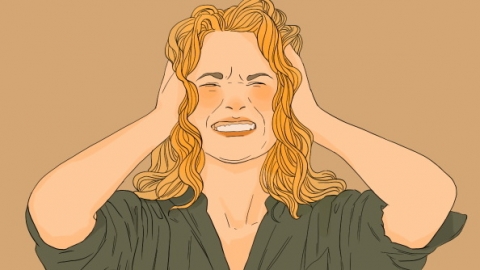What causes unexplained anxiety upon waking up every morning?
Waking up with unexplained anxiety every morning may be caused by insufficient sleep, hormonal fluctuations, generalized anxiety disorder, hyperthyroidism, or neurasthenia. This can be improved through catching up on sleep, adjusting sleep schedules, and medication. If anxiety persists or worsens, or is accompanied by palpitations and insomnia, prompt medical attention is necessary.
1. Insufficient Sleep: Chronic late nights and poor sleep quality prevent the brain from fully resting, leading to disrupted neural regulation and increased likelihood of anxiety upon waking. It is recommended to maintain a regular sleep schedule, ensuring 7–8 hours of sleep each night, and avoid behaviors that impair sleep, such as using mobile phones or staying up late before bedtime.
2. Hormonal Fluctuations: Changes in early-morning levels of hormones such as cortisol and adrenaline can trigger anxiety in sensitive individuals, possibly accompanied by low mood and irritability. It is advisable to rise slowly in the morning and use stretching or deep breathing exercises to regulate your state, avoiding an abrupt transition into a high-stress routine.

3. Generalized Anxiety Disorder: Prolonged psychological stress can lead to imbalances in brain neurotransmitters, resulting in persistent anxiety that is often more pronounced in the morning, along with unfounded worries and restlessness. Under medical guidance, medications such as paroxetine hydrochloride tablets, sertraline tablets, or lorazepam tablets may be used to alleviate symptoms.
4. Hyperthyroidism: Excessive secretion of thyroid hormones increases metabolic rate and nervous system excitability, causing morning anxiety often accompanied by palpitations, heat intolerance, and excessive sweating. Patients may take medications such as methimazole tablets, propylthiouracil tablets, or propranolol tablets under medical supervision to relieve symptoms.
5. Neurasthenia: Prolonged mental stress and fatigue can lead to diminished nervous system function, resulting in morning anxiety along with difficulty concentrating, fatigue, and weakness. Patients may follow medical advice to use medications such as oryzanol tablets, vitamin B1 tablets, or diazepam tablets to improve symptoms.
Maintain a regular sleep schedule and ensure adequate sleep. Engage in light morning exercises such as walking or jogging, eat a light and balanced diet, learn to manage emotions effectively, communicate regularly with others, and reduce psychological stress to support overall well-being.




